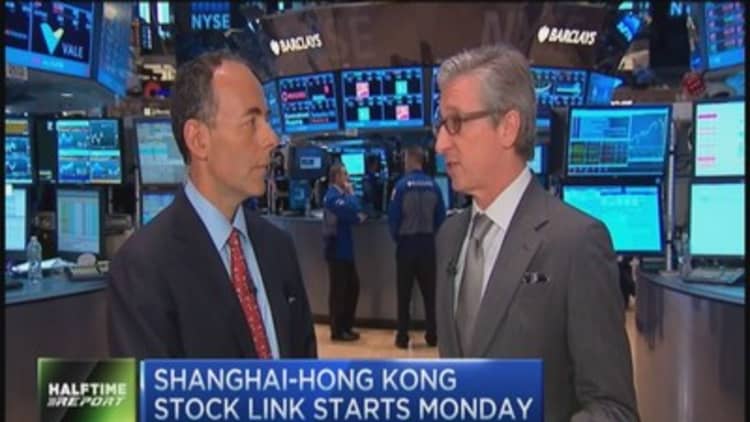
The Hong Kong-Shanghai stock exchange link-up is one of the biggest developments in years for investors in international markets.
I told you this morning that beginning Monday, November 17, foreign investors will be able to directly buy individual shares of 560 Chinese mainland stocks. They will be able to do this because there will be a direct link between the Hong Kong Stock Exchange and the Shanghai Stock Exchange.
Bottom line: Anyone who opens a brokerage account with a firm in Hong Kong will be able to own a vast swath of mainland Chinese shares.
U.S. investors have already been able to buy some of the mainland shares through ETFs like the Market Vectors China ETF (PEK) and the Deutsche X-trackers (ASHR), but these are baskets of stocks pegged to indexes, not individual shares. Until now.
Why do we care about this? Because prior to today, the Chinese stocks that were available to U.S. investors—those that listed in Hong Kong, or those that dual-listed in the U.S. and China—were mostly big, state-owned enterprises. Mostly big banks and commodity companies.
But what international investors want to access is the Chinese consumer. With the exception ofAlibaba (BABA) and a few other internet plays, that access has not been available. Until now.
Think about all the companies that cater to the consumer in China that foreign investors can't access: builders, telecom, energy, smaller banks, consumer companies.
And with all due respect to Alibaba, there are plenty of other internet and tech companies in China. Think about this: China is living on-line. We think we're into buying online and social media--China is way ahead of us. China is really living in the online economy--the new economy.
They have, for example, leapfrogged a large part of the retail bricks and mortar build-out that the U.S. has experienced and gone straight to online buying. It's the same with the phone industry--they've gone wireless without ever building out the massive wire line infrastructure the U.S. developed.
These smaller companies will now be accessible to investors.
It's the same case with China's bond market, which is also opening up. Today Market Vectors launched a bond ETF focused exclusively on Chinese bonds traded in mainland China: theChinaAMC China Bond ETF (CBON).
CBON will be based on an index that comprises 1,446 bonds of 244 Chinese issuers. While the U.S. is still the largest bond market in the world, with about $17 trillion, China is rapidly moving up at $5 trillion (Japan is second at $10 trillion, Germany is $4 trillion).
I am not going to pass judgment on whether these companies are under-valued, over-valued, or too opaque to invest in. The international investors will go a long way toward sorting that out in the coming years.
They're going to have to sort it out. That's because this action has opened the floodgates for mainland China to dramatically expand its presence in Emerging Market and World indices.
That will initiate a flood of buying into Chinese stocks in the next several years.
Here's why: Mainland China is not part of most global indexes. If, for example, MSCI would include mainland China, with $1.2 trillion in assets, in its Emerging Markets Index, China would go from a roughly 20 percent weighting to roughly 30 percent weighting.
In the all-world index, China would double from about a 2 percent weighting to about 3.5 percent.
What does this mean? It means that, down the road, there will be a tidal wave of money going into Chinese stocks...just because everyone who owns these indexes through ETFs or copy them through mutual funds will have to buy them.
When could this happen? MSCI has this under review now. Not clear when an announcement would be made, but it could be as early as December and would likely be another year before inclusion is complete. It could take longer, of course.
Here's another important point: China may get even bigger in emerging market indexes. South Korea and Taiwan will likely be moved out of emerging markets and into developed markets. Not clear when that might happen, but my bet is it will likely be within the next two years.
If that happens, and nothing else is included (Nigeria anyone?) China could be 50 percent of the MSCI Emerging Markets Index a few years from now.
Regardless. The wheels have now been set in motion. China is about to truly open up its stock market (as well as its bond market).
This is going to change everything.



